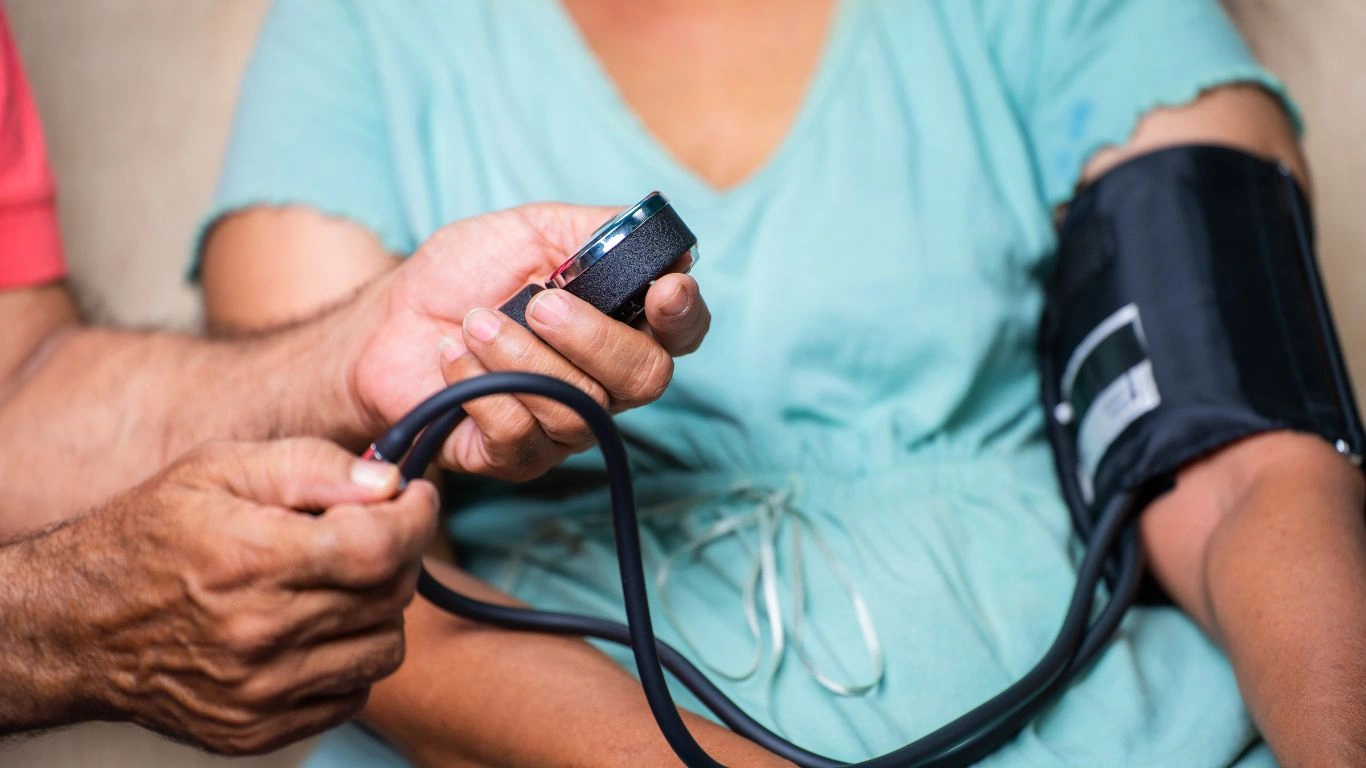7 Powerful Ways to Prevent Joint Deformities in Rheumatoid Arthritis
When it comes to managing high blood pressure, one thing many people overlook is how family history affects blood pressure levels. If you’ve ever been told, “It runs in the family,” when discussing health issues, there’s a good reason for that. Genetics play a major role in hypertension, and if your parents or grandparents had high blood pressure, there’s a good chance you could be at risk too. But does that mean you’re doomed to follow the same path? Absolutely not! Let’s break it down and see what you can do about it.
Understanding the Genetic Connection

Hypertension isn’t just about lifestyle choices like diet and exercise—it’s also written in your DNA. Some people are genetically predisposed to high blood pressure due to inherited traits that affect how their body regulates salt, stress responses, and blood vessel function. If one or both of your parents had high blood pressure, your chances of developing it increase significantly.
How High Is the Risk?
Studies suggest that if one of your parents has hypertension, your risk jumps by about 30-50%. If both parents have it, your odds go even higher. But before you panic, remember that genes are not destiny. While family history may set the stage, your daily habits determine whether you stay in control or let blood pressure levels spiral out of balance.
The Role of Epigenetics
Here’s something fascinating: while your genes may influence your risk, they don’t act alone. Epigenetics—the way your environment and lifestyle interact with your DNA—can determine whether those genetic risks turn into real health problems. That means even if hypertension runs in your family, making healthy choices can keep those genes “switched off” and prevent issues down the road.
Other Factors That Compound the Risk

Genetics might give you a predisposition, but it’s often a mix of hereditary and lifestyle factors that push blood pressure into the danger zone. Some key contributors include:
- Salt Sensitivity: Some people have a genetic tendency to retain more sodium, leading to increased blood pressure.
- Stress Responses: If your family has a history of high-stress reactions, your body may release more cortisol and adrenaline, which can raise blood pressure.
- Metabolism and Weight: Genetic factors influence how your body stores fat and processes food, affecting blood pressure levels.
- Chronic Conditions: Diabetes, kidney disease, and cholesterol issues often run in families and contribute to hypertension.
My Own Experience with Family History and Blood Pressure
Let me get personal for a second—high blood pressure runs deep in my family. My grandfather had it, my mom struggled with it, and sure enough, I found myself dealing with rising numbers in my 30s. But here’s the thing: knowing my family history gave me a head start. I started paying closer attention to my diet, managing stress, and keeping an eye on my numbers early on. It’s not about fear—it’s about taking charge before it’s too late.
Can You Prevent Genetic Hypertension?
Absolutely! Just because high blood pressure runs in your family doesn’t mean you’re stuck with it. In fact, plenty of people with a strong genetic risk never develop hypertension because they take the right precautions. In the next section, we’ll dive into what you can do to outsmart your genes and keep your blood pressure in check.
Smart Lifestyle Changes to Overcome Genetic Risks

Now that we know how family history affects blood pressure levels, let’s talk about what you can do to take control. Genetics might set the stage, but your daily habits determine the final act. Trust me, I’ve been there—learning that hypertension ran in my family was a wake-up call, but it also empowered me to make better choices. The key is consistency, not perfection!
1. Keep Your Sodium Intake in Check
If you’re genetically prone to high blood pressure, chances are your body retains sodium more than others. That means too much salt can send your numbers skyrocketing. Here’s what helps:
- Cut back on processed foods: Canned soups, chips, and frozen meals are often loaded with hidden sodium.
- Read food labels: You’d be surprised how much salt is packed into everyday foods.
- Opt for fresh ingredients: Cooking at home lets you control how much salt goes into your meals.
I used to love salty snacks, but after seeing my blood pressure creep up, I started making small swaps—fresh fruit instead of chips, herbs instead of salt. And you know what? My taste buds adjusted, and my blood pressure thanked me for it!
2. Stay Active, Even If You Have “Bad Genes”
Exercise is one of the best ways to fight back against a family history of hypertension. It strengthens your heart, improves circulation, and helps keep stress hormones in check. But you don’t need to train like an athlete—just aim for at least 30 minutes of moderate activity most days.
- Walking: A simple 30-minute walk can do wonders for your heart.
- Strength training: Helps improve circulation and manage weight.
- Yoga or stretching: Reduces stress and supports heart health.
Personally, I found that getting a fitness tracker helped keep me accountable. Seeing those steps add up each day gave me a little extra motivation!
3. Manage Stress Like a Pro
Here’s a fact: stress can make high blood pressure worse. If your family has a history of hypertension, chances are you might also inherit a tendency to respond to stress with higher adrenaline and cortisol levels. Over time, this can take a toll on your heart.
Some stress-busting techniques that actually work:
- Deep breathing: A few minutes of slow, deep breaths can lower blood pressure instantly.
- Meditation or mindfulness: Helps reduce stress and promotes relaxation.
- Quality sleep: Poor sleep can spike your blood pressure, so aim for 7-9 hours a night.
For me, learning to step away from my phone at night and practicing mindfulness made a massive difference. It’s amazing how much better I felt after making sleep a priority.
Monitoring Your Blood Pressure: Why It Matters

If high blood pressure runs in your family, regular monitoring is non-negotiable. Many people don’t realize they have hypertension until it’s too late. I always tell my friends and family: know your numbers before they become a problem.
How Often Should You Check?
It depends on your risk level. Here’s a general guide:
- Normal BP (below 120/80): Check at least once a year.
- Elevated BP (120-129/80): Monitor every few months.
- Hypertension (130/80 and above): Regular home monitoring is recommended.
Investing in a good home blood pressure monitor changed everything for me. Instead of waiting for doctor visits, I could track my progress and make real-time adjustments.
What If Your Numbers Start Rising?
Don’t panic! Blood pressure isn’t set in stone, and small changes can bring it back to a healthy range. If your numbers start creeping up:
- Reassess your diet: Are you eating too much sodium?
- Stay consistent with exercise: Even short walks help.
- Check stress levels: Are you managing daily pressure well?
- Talk to your doctor: They can help you adjust your approach.
When I saw my numbers trending up, I made a few tweaks—more movement, better sleep, and less processed food. Within months, my blood pressure improved without medication.
Final Thoughts: Genes Aren’t the Whole Story
Yes, family history affects blood pressure levels, but it’s not a life sentence. Your genes might give you a starting point, but your lifestyle determines the outcome. By making smart choices today, you can prevent hypertension from becoming part of your story.
In the next section, we’ll dive deeper into medications, supplements, and alternative therapies that can help manage blood pressure naturally.
Case Studies & Real-Life Examples

Hearing real-life stories of people who took control of their blood pressure—despite a strong family history—can be incredibly inspiring. I know it was for me when I first started making changes! Let’s look at a few cases that highlight how small lifestyle shifts can make a big impact.
Case Study #1: James, 45 – The Weekend Warrior
James had a family history of hypertension—his father and grandfather both suffered from high blood pressure. Despite eating fairly well, he wasn’t consistent with exercise. His numbers started creeping into the prehypertension range (128/85), and his doctor warned him he was on the road to full-blown hypertension.
What changed? James made it his goal to get at least 150 minutes of exercise per week. He started playing basketball every Saturday and committed to daily 30-minute walks. Within six months, his blood pressure dropped to a healthy 118/78. His doctor was impressed, and James felt more energized than ever.
Case Study #2: Maria, 52 – The Salt-Lover Who Switched It Up
Maria loved her salty snacks, but her family history of hypertension was catching up with her. Her blood pressure hit 135/85, and she constantly felt bloated. She wanted to avoid medication, so she took action.
What changed? Maria reduced her sodium intake by swapping out processed foods for fresh, home-cooked meals. She replaced table salt with herbs like garlic, basil, and oregano. Within four months, her blood pressure dropped to 122/80, and she no longer felt sluggish. Her biggest takeaway? “I don’t even miss the salt anymore!”
Case Study #3: David, 60 – Managing Stress to Save His Heart
David worked in a high-pressure job for decades. Stress was part of his daily routine, and his blood pressure reflected that—140/90. With a family history of heart disease, his doctor urged him to take it seriously.
What changed? David incorporated daily meditation and breathing exercises into his morning routine. He also made it a habit to unplug from work emails after 7 PM. The result? His blood pressure dropped to 125/82, and he felt more relaxed than he had in years.
Key Takeaways: What You Need to Remember
Let’s break it down. If you’ve got hypertension in your family, you’re not doomed—it just means you need to be proactive. Here are the main things to remember:
- Genetics play a role, but lifestyle matters more. You have the power to keep your blood pressure in check.
- Diet is everything. Cut back on processed foods, sodium, and excess sugar. Load up on potassium-rich foods instead.
- Exercise is non-negotiable. Just 30 minutes a day can make a world of difference.
- Stress management is key. Meditation, deep breathing, and quality sleep can lower blood pressure naturally.
- Regular monitoring keeps you informed. Don’t wait until your doctor tells you there’s a problem—stay ahead of it.
FAQs
Still have questions? Here are some of the most common ones people ask:
1. If my parents have high blood pressure, will I get it too?
Not necessarily! While genetics increase your risk, lifestyle choices determine whether that risk turns into a real issue. Eat well, stay active, and monitor your blood pressure regularly.
2. Can high blood pressure be reversed?
Yes! In many cases, lifestyle changes can lower blood pressure naturally without medication. Even if you’re already on medication, healthy habits can help reduce your dependency on it.
3. What foods lower blood pressure naturally?
Foods rich in potassium, magnesium, and fiber help regulate blood pressure. Some of the best include:
- Leafy greens (spinach, kale)
- Berries (blueberries, strawberries)
- Bananas
- Oats
- Fatty fish (salmon, mackerel)
4. How often should I check my blood pressure?
If you’re at risk, checking it at least once a month at home is a good idea. If you’ve already been diagnosed with hypertension, your doctor may recommend more frequent monitoring.
Bonus: Additional Resources or DIY Tips
Want to go a step further? Here are some extra resources and DIY tricks to help keep your blood pressure in check:
- Try a home remedy: Drinking hibiscus tea has been shown to lower blood pressure naturally.
- Follow a DASH diet plan: The Dietary Approaches to Stop Hypertension (DASH) diet is one of the best for lowering blood pressure.
- Get a home blood pressure monitor: This helps track your progress and catch any spikes early.
Appendix: Table, References, and Call to Action
Blood Pressure Categories
| Category | Systolic (Top Number) | Diastolic (Bottom Number) |
|---|---|---|
| Normal | Less than 120 | Less than 80 |
| Elevated | 120-129 | Less than 80 |
| Hypertension (Stage 1) | 130-139 | 80-89 |
| Hypertension (Stage 2) | 140 or higher | 90 or higher |
| Hypertensive Crisis | Higher than 180 | Higher than 120 |
References
For more in-depth reading, check out these trusted sources:
Disclaimer
The information in this article is for educational purposes only and should not replace medical advice. Always consult your doctor before making any significant changes to your health routine.
Final Thoughts & Call to Action
If you have a family history of hypertension, now is the time to take action. Small daily habits make all the difference. Start with one change—whether it’s reducing salt, exercising more, or tracking your blood pressure regularly.
Have you successfully lowered your blood pressure despite a family history? I’d love to hear your story in the comments below! Let’s inspire each other to take control of our health. 💪

Dr. Gwenna Aazee is a board-certified Internal Medicine Physician with a special focus on hypertension management, chronic disease prevention, and patient education. With years of experience in both clinical practice and medical writing, she’s passionate about turning evidence-based medicine into accessible, actionable advice. Through her work at Healthusias.com, Dr. Aazee empowers readers to take charge of their health with confidence and clarity. Off the clock, she enjoys deep dives into nutrition research, long walks with her rescue pup, and simplifying medical jargon one article at a time.







